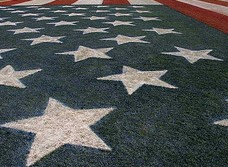|
9-11's Aftermath Brought Tough Times to Tourism Industry  September 08, 2011 | WMFE - 9-11's aftermath brought turmoil to the area's tourist-based economy. Some of the changes put in motion at that time still echo through Central Florida ten years later. Before September 11th, 2001, Orlando actor Mark Taylor was working full-time at Walt Disney World. He performed for big crowds in a variety of stage shows. But after 9-11, everything changed. “The parks then became like a ghost town,” Taylor says. “There [were] very few people in the parks because nobody wanted to get on planes, nobody wanted to fly.” Within a month, Mark went from a full-time job at Disney to a part-time fill-in position with no guarantee of work. And he was far from the only one – in the four months after the 9-11 attacks, Workforce Central Florida says the local tourism industry shed nearly 15,000 jobs. Mark was angry at the 9-11 hijackers for creating his sudden predicament. “These idiots affected now my life, all the way here in Florida,” he says. “It wasn’t as devastating as what happened in New York, but it was still pretty devastating for what it did to my friends, and even changed our way of life.” “Immediately after 9-11, the bottom fell out,” agrees Duncan Dickson, an expert on the hospitality industry at University of Central Florida. “Conventions were cancelled, trips were cancelled, many, many things were cancelled, because we didn’t know what was going on – are there more attacks? It’s the immediate fear.” That fear of the unknown kept many people closer to home, driving tourism across Central Florida to a record low. “Occupancies, of course, began to decline dramatically in days and weeks following," remembers local hotel owner Harris Rosen. What he saw at his properties was happening in hotels across Central Florida – occupancy rates plummeted nearly 20% in just one month, between August and September of 2001. That’s according to numbers from Smith Travel Research. Rosen knew immediately on 9-11 that tough times were ahead. He says everyone on his management team agreed that day to take a significant pay cut, including Rosen himself. “I said I wouldn’t receive any salary at all until we were back to normal.” “Back to normal” took about a year, says Rosen. By the end of 2002, hotel occupancy rates were back up to 58%, just slightly below what they were before the attacks. Rates have fluctuated since. They now stand at 73%. The legacy of 9-11 can still be felt at Central Florida’s theme parks, especially when it comes to security, points out UCF hospitality expert Duncan Dickson. “All of a sudden, you start to see uniformed police officers,” Dickson says. “And the mental picture that goes through a guest’s mind prior to 9-11 is, ‘There’s a police officer, something must be wrong.’ Post 9-11 – ‘There’s a police officer. Wow, okay, I feel safer.’” Bag searches also make guests feel safer, adds Dickson. Before 9-11, theme park security personnel did not look through backpacks and purses before guests entered the park. As for actor Mark Taylor, who lost his full-time job at Disney just after 9-11, he’s thankful for the changes since then. “Reliving that time is so unpleasant. But I consider myself fortunate to still be working,” says Taylor. “I’m just glad things are better than they were back then.” He’s not a full-time performer at Disney again, but he is working there most days of the week. Plus, he’s now part-owner of the Master Class Academy in Winter Park, a performing arts and music school for kids and adults. He says he’s happy to have new opportunities, as Central Florida continues to bounce back. |
|
|